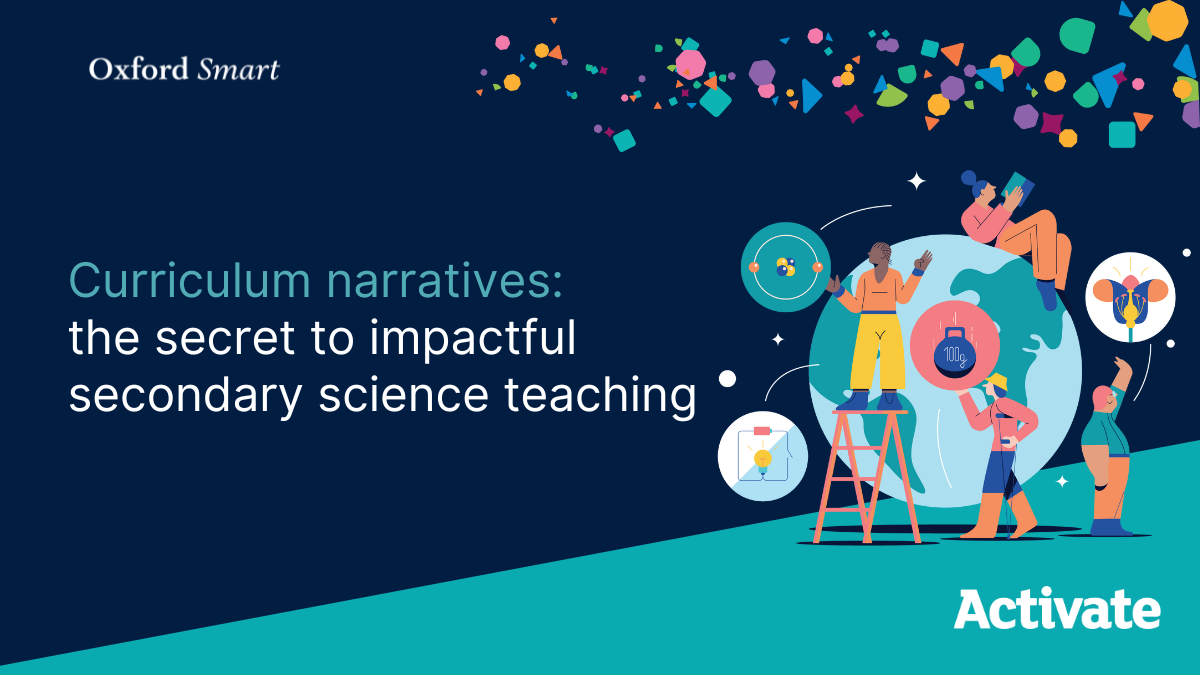We are predisposed to stories. We like structures that have a beginning, middle and end. We like a sense of purpose, a journey and a climax. As we experience a story, the more we learn, the more invested we become and the more we want to know. This is why curriculum narratives can play an important role in teaching and learning.
When designing the Oxford Smart Activate curriculum, we considered the whole school Science journey from Key Stage 1 to post-16, so that we could be clear on where Key Stage 3 fitted into the narrative of learning science.
The main curriculum narrative
The main thread of the story is the science content. We audited the sequences for Biology, Chemistry and Physics. In doing this, we identified the main characters in our story: the fundamental concepts. These are the concepts that are foundational and underpin the whole story, e.g. particle theory, forces and cells to systems. We need these to be taught in a logical sequence that builds on prior knowledge and develops students’ knowledge. As each core concept is taught and developed, the disciplinary knowledge from working scientifically is introduced, making explicit links to how we know the science content.
However, alongside the main narrative there are themes that run in parallel to the sequence of learning events.
The Awe and Wonder theme
Good stories provide memorable experiences. Curriculum narratives give examples of resources and strategies to motivate, stimulate thought and create memorable learning experiences. In designing Oxford Smart Activate, the team were keen to highlight these key opportunities to spark interest and the desire to know more.
The Misconceptions theme
Misconceptions and troublesome knowledge can present challenges on the learning journey. These present conflicts to overcome, and being aware of these and challenging them helps reduce them along the way. Curriculum narratives support teachers to teach science, whatever their specialism, by identifying common misconceptions and offering strategies to challenge these.
The Learner Identity theme
It is important that all learners can see themselves and people like them in the science narrative. They need to be able to know that they can use or do science as part of their life, where science becomes part of their identity.
For us, it was important that every student is the central character in our science story. We have structured the narrative so that each student has opportunities to identify with the science they are learning.
The aim is to encourage students to become invested in these stories through understanding why the fundamental concept is relevant to their life, to society and where it is applied in different jobs or careers.
Listener to author
The final theme that aims to do this is metacognitive learning, with the aim to help learners learn, become narrators of their own learning, their own science story.
Perhaps, to extend the metaphor a little further, the aim of our curriculum narratives is for students to be inspired enough to become an author of the story of science. Either in how they engage positively with science as part of their everyday life or by actually doing science to further our knowledge and understanding. Whatever the case, we want students to be confident with science knowledge and skills and understand the value of these in their life and in society.
The story of school science spans from primary to secondary education. The curriculum narratives are important for teachers to know the story so far, what part of the narrative to tell and know what comes next, as well as the themes we want to develop in our teaching and in our students lives. Curriculum narratives support the telling of this story.
Andy Chandler-Grevatt, Curriculum Editor Oxford Smart Activate
Oxford Smart Activate is a complete Key Stage 3 science curriculum: informed by research and you. With Oxford Smart Activate, you are fully supported to deliver a Key Stage 3 science experience that connects to your students lived experiences. One that nurtures students, builds skills and knowledge, and carries that curiosity through to GCSE.
Further reading:
- ‘Metacognitive learning skills at KS3′ by Lauren Stephenson
- ‘Developing self-regulation in the science curriculum’ by Andrew Chandler-Grevatt
- ‘Metacognitive modelling – where does it fit in the classroom? by Nathan Burns
